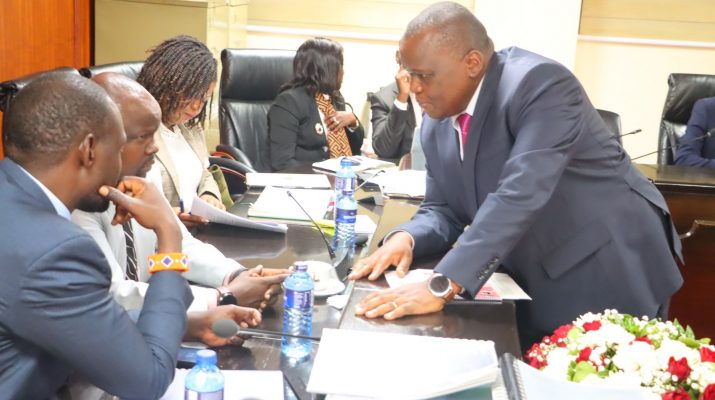By Emmaculate Lesa
The Kenya Electricity Transmission Company (KETRACO) is facing increasing pressure from Members of Parliament (MPs) regarding rising legal and financial risks valued at KSh 12.97 billion.
This issue arises from court disputes, unpaid contractual claims and deferred compensation for land, all of which threaten the completion of major power projects.
Members of Parliament seated in the Public Investments Committee on Commercial Affairs and Energy held a meeting with KETRACO’s chief management to deliberate on the firm’s audited financial statements for the period 2018/2019 to 2022/2023.
The Committee, chaired by Pokot South MP Hon. David Pkosing, met with KETRACO’s leadership to scrutinize audited accounts covering the financial years 2018/19 to 2022/23. The session focused on accountability, ongoing projects, and financial exposure.
Leading the company’s delegation was Managing Director Dr. Eng. John Mativo, who fielded a series of tough questions from legislators.
Chief among them was the growing concern over contingent liabilities, especially contractor disputes and legal battles involving wayleave compensation that could balloon into costly obligations if not addressed.
“Should these liabilities materialize, KETRACO could find itself under immense financial strain, affecting its core function of transmitting electricity to homes and businesses across the country,” Hon. Pkosing cautioned.
The Company traced much of the financial exposure to a terminated contract under the Kenya-Uganda Lessos-Tororo 400kV interconnection project, part of the larger initiative to integrate regional power grids.
Although KETRACO reassured the Committee that these risks are reviewed frequently, MPs were concerned by the prolonged nature of the unresolved issues.
Also, under sharp focus was the company’s failure to compensate landowners affected by power transmission projects. As of earlier this year, KETRACO owed KSh 3.39 billion in unpaid wayleave compensation.
Management cited delays in exchequer funding, lengthy negotiations with landowners, and legal disputes as the main reasons behind the backlog.
Dr. Mativo told MPs that the outstanding figure had since reduced to KSh 1.47 billion by June 2025, thanks to support from the National Treasury and collaboration with counties and affected families. However, he acknowledged that payments remain tied to available funds.
“Our progress is constrained by budget limitations and, in some cases, unresolved ownership or documentation issues. But we remain committed to ensuring every genuine claim is settled fairly,” Dr. Mativo said.
MPs also expressed alarm over the significant delays in completing four major transmission projects. These include: The 220kV and 132kV transmission lines and substations project, the Power Transmission System Improvement Project, the Kenya-Tanzania Power Interconnection Project and the Kenyan section of the Nile Equatorial Lakes Countries Interconnection Project.
According to audit reports, delays in completing these projects risk inflating costs and prolonging electricity shortages, especially in regions relying on expanded power access for development.
In response, KETRACO attributed the delays to procurement challenges, legal hurdles, and the complexities of coordinating multinational infrastructure projects.
Adding to the company’s woes was the revelation that KETRACO has been charging its main client, the Kenya Power and Lighting Company (KPLC), for transmission services without a signed contract.
While the revenue is guided by an independently determined tariff, MPs insisted that a formal agreement is crucial to avoid misunderstandings and disputes over payments.
“We cannot rely on drafts and good faith when handling billions in public resources. A binding agreement is non-negotiable,” Hon. Beatrice Adagala (Vihiga).

